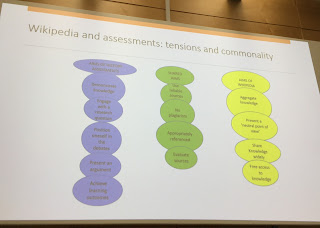In this session Dr Delphine Doucet (University of Sunderland) presented insights from her research exploring the relationship between history academics’ conceptions of knowledge and authority in their fields of research and their assessment of Wikipedia’s authority and credibility as a teaching resource.
She talked about her context - until recently she was a history lecturer, with a focus in intellectual history16th-18th, and one of the questions in that field is how authority is created, and what tools people use to mark authority. Then on the LISM course at Sheffield iSchool (where I was her dissertation supervisor) she got interested in the issue of Wikipedia and authority (stimulated by work by Diana Park & Lauri Bridges - see e.g. here). Doucet talked about the way in which wikipedia has entered the academic discourse, and how the literature shows that academics in some disciplines (e.g. health) have been more positive than others. She discovered that history articles are the most consulted, and all this led to examining history academics' opinions and practice concerning Wikipedia.
Doucet interviewed 8 academic historians, from different types of university and at different stages of their career.These are some insights. Firstly there was the definition of authority. There are some traditional types of marker (such as publication, academic position) but also authority is seen as cultural and situated and as one interviewee said "bound up with kind of cultural assumptions and social assumptions we make".
Doucet asked each historian to evaluate 2 Wikipedia pages related to their subject specialism: one broader and one more specialist. There was consensus that the pages were factually accurate - however they were also problematic. One problem was giving too much prominence to particular aspect - so inaccuracy which distorts the subject, but not factual inaccuracy. Another problem was the structuring of articles which was needed to make them better relect current thinking. A further problem is in niche areas - for example a topic where the published information is in old encyclopaedias, so (as one interviewee said) a 21st century medium presenting 19th century ideas. There may be too much influence from the niche enthusiast with a particular viewpoint. While Wikipedia was good with factual information, it was not good in areas where there were different perspectives (which a historian would want represented) - this was a problem partly because of Wikipedia's emphasis on consensus. There was also a cultural/linguistic issue (e.g. French vs. English Wikipedia).
In terms of teaching with Wikipedia, two interviewees were reluctant to see Wikipedia as a teaching tool, and the others were interested (one was using it already) and wanted to move away from the old "don't use wikipedia" position. They might recommend the Wikipedia article as a starting point, but caveats included the fact that references in Wikipedia articles might not be accessible (e.g. referring to older textbooks etc.) and might not reflect the best reading recommended for that topic. The interviewees used it themselves for leisure, but for historical practice it was used mainly to check dates. They considered using wikipedia editing as part of teaching and assessment, but there were tensions which she illustrated in a model (see the image above). Problems included the question of whether editing in wikipedia would develop historical writing skills (as required elsewhere in the programme) and at what stage of education it would be feasible/ usable. However Wikipedia can be useful to develop other information and writing skills.

No comments:
Post a Comment